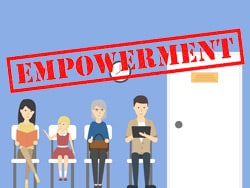My Idea of Patient Empowerment
As a conscientious new doctor in my first job, I took great pride in delivering comprehensive care and empowering patients with the latest medical advances and scientific breakthroughs. While reviewing the range of potential treatments for an elderly woman, I paused to allow her time to share how she wished to proceed. Her response: "What's the matter, honey? Don't you know what you're doing?"
I thought I knew what I was doing. I had condensed years of medical training into our 30-minute appointment so that I could educate, inform, and empower this woman to take control of her health. Unfortunately, she didn't want to participate in my patient empowerment project. She just wanted a pill.

"Empowerment" is defined as the process of becoming stronger and more confident, especially in controlling one's life and claiming one's rights. Patient empowerment involves shifting authority or power to patients so they can make more informed healthcare decisions. I wanted to teach my patients, to share information with them so that they could take initiative and make decisions to solve their own problems and improve their health.
The term "patient empowerment" assumes that if physicians and healthcare professionals provide skills, information, resources, and authority to patients, then patients will be more active and accountable for their decisions, and that will ultimately contribute to improved competence, self-reliance, and better health outcomes.
That's a big assumption.
In my effort to empower my patient, I left her confused and lacking trust in my ability to care for her. Maybe patient empowerment is a myth. Do patients want to be empowered? What is patient empowerment anyway?
Many physicians like me go to great lengths to get patients more involved in their own care. We're disappointed when patients prefer that we just tell them what to do. On the other hand, some physicians complain that it takes too much time when patients arrive with pages of printouts from unreliable medical sources. Do physicians consider some "empowered" patients to be helpful or irritating? Should we strive to educate and empower patients? What does patient empowerment mean to you?
Medscape polled physicians and health professionals with the question, "Which sentences describe your definition of patient empowerment?" (respondents were to select all that applied). The majority of respondents agreed that patient empowerment means that the patient asks questions about pros and cons of treatment options and drug side effects (81%), the patient takes an active role in deciding which treatment or drug or therapy is most useful for them (74%), and the patient researches symptoms and treatments and brings information and questions to discuss with their physician (62%).
Most respondents also agreed that patient empowerment means that the patient has access at your practice site to educational material about health and wellness and credible sources and conditions (60%) and the patient can access lab results and personal health records online (59%), though these statements have more to do with the health system's willingness to provide data and education versus true interest on the part of patients in accessing these materials. Less than one half of physicians and health professionals polled believe an empowered patient asks for and receives a copy of the electronic health record (47%).
Surprisingly, one half of all respondents (49%) believe an empowered patient is not a patient who asks how many times you've done a given procedure and complication rates. However, if a patient shows up for their scheduled visits and attends follow-up visits, 60% of docs believe the patient is empowered.
That's setting the bar pretty low. Not being a no-show doesn't make a patient empowered. Arriving in a clinic and sitting in the waiting room isn't an empowering experience for most.
Medscape Business of Medicine © 2017 WebMD, LLC
Any views expressed above are the author's own and do not necessarily reflect the views of WebMD or Medscape.
Cite this: Pamela L. Wible. Is Patient Empowerment a Myth? - Medscape - Oct 11, 2017.




Comments